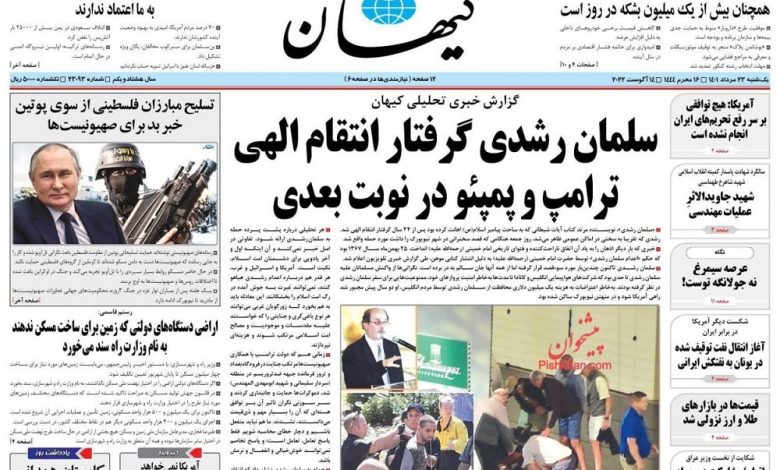Iran’s Regime Reinforces Terrorist Concerns With Justification for Rushdie Attack

Written by
Mahmoud Hakamian
Front page of Khamenei’s mouthpiece, the Kayhan daily: Salman Rushdie caught in divine revenge, Trump and Pompeo in the next turn
Iran’s regime Foreign Ministry offered the regime’s first official statement on Monday regarding the attempted murder of Salman Rushdie, simultaneously denying any responsibility for it while also asserting that it was entirely justified. Since 1989, the author has been the subject of a fatwa issued by the regime’s founder Ruhollah Khomeini, which called for labeling him as an apostate and enemy of God and called for his death.
On Friday, Rushdie was stabbed repeatedly after taking the stage at a literary event in Western New York where he was scheduled to deliver a speech. Many initial reports of the attack claimed that a motive was unclear, while others mentioned the Iranian regime’s longstanding incitement against Rushdie as the likeliest explanation. On the other hand, many reports also claimed that the regime had distanced itself from Khomeini’s fatwa in recent years, though the accuracy of this claim is questionable.
In 2005, Khomeini’s successor Ali Khamenei, who still holds the supreme leadership today, reaffirmed the contents of the fatwa, noting that Rushdie’s killing would be religiously justified under the regime’s official, fundamentalist interpretation of Islamic law. In 2014, one of Khamenei’s close advisors and a member of the powerful clerical body known as the Assembly of Experts, Ahmad Khatami, said at a Friday prayer gathering in Tehran, “This fatwa is still fresh among Muslims, and many believers are looking for an opportunity to implement Imam’s order.”
What to make of Salman Rushdie’s murder attempt?
Even more recent references to the fatwa have been recorded in Iranian state media, which is supportive of the regime. In some cases, those references have linked the official, standing death threat against Salman Rushdie to less official but perhaps equally salient threats against Western lawmakers, supporters of Iran’s pro-democracy Resistance movement, and other perceived threats to the regime’s hold on power.
On December 31, 2020, the state-run newspaper Hamshahri published remarks from the head of the Islamic Revolutionary Guard Corps’ foreign special operations division, the Quds Force, threatening members of the former U.S administration officials over the drone strike which killed his predecessor the prior January. The targets of that threat, Esmail Qaani said, “should learn how to live a secret lifestyle like Salman Rushdie because the Islamic Republic will avenge Qassem Soleimani’s death.”
The attacker, the Lebanese-born Hadi Matar’s social media activity, included content praising the IRGC, whose activities in his country of origin effectively birthed the terrorist group Hezbollah. His arrest came just two days after the US Department of Justice revealed details of its case against an IRGC operative named Shahram Poursafi, who has apparently spent several months attempting to recruit assets inside the United States to assassinate former US National Security Advisor John Bolton as part of a broader revenge plot related to the Soleimani killing.
In an op-ed published by Fox News, James Phillips of the Heritage Foundation argued that newly released information about the plot against Bolton was proof that the Iranian regime poses a “lethal threat” to the United States and its allies, which must be addressed. Subsequently, Rishi Sunak, one of two candidates for Prime Minister in the United Kingdom, described the Rushdie attack as a “wake-up call for the West” with regard to Iranian terrorist threats and their relevance to the fraught negotiations, which aim to restore the 2015 Iran nuclear deal.
While Phillips explicitly called for an end to those talks and a return to “maximum pressure” on the Iranian regime, Sunak emphasized the potential value of following America’s lead by formally labeling the IRGC as a terrorist organization and increasing sanctions on it accordingly.
Although the regime’s Foreign Ministry spokesman Nasser Kanani insisted that Tehran “categorically denies” any connection to the would-be assassin and that “no one has any right to accuse the Islamic Republic of Iran,” he also rejected the notion of condemning the attacker or the attack itself.
Clerical Regime Welcomed and Promoted the Attack on Salman Rushdie Based on Khomeini and Khamenei’s Fatwa #Iran #SalmanRushdie https://t.co/cUzyLycxP6
— NCRI-FAC (@iran_policy) August 16, 2022
“We don’t consider anyone deserving reproach, blame or even condemnation, except for (Rushdie) himself and his supporters,” Kanani said before going on to assert that the author’s alleged blasphemy was an “insult against followers of all religions,” which had angered “millions of people in Arab, Islamic and non-Islamic countries.”
Kanani openly justified Rushdie attempted murder by stating that he had “exposed himself to popular anger and fury through insulting the sacredness of Islam.”
Some state-run media outlets were even more direct with their justifications and their praise for Hadi Matar. The state-run newspaper Kayhan, for instance, offered to “kiss the hands of the one who tore the neck of the enemy of God with a knife.” In applying that label to Rushdie, Kayhan recalled attention to the vaguely defined religious crimes for which critics of the Iranian regime can be prosecuted and even sentenced to death inside Iran.
In 1988, Ruhollah Khomeini used the term “enmity against God” in a fatwa calling for the death of all such critics who were known or suspected to be members of the leading pro-democracy opposition group, the People’s Mojahedin Organization of Iran (PMOI/MEK). Consequently, in the summer of that year, “death commissions” interrogated political prisoners all across the country and ordered the execution of over 30,000. In recent years, some international jurists have joined the MEK in calling for those mass executions to be investigated as an instance of genocide targeting the main opposition.

